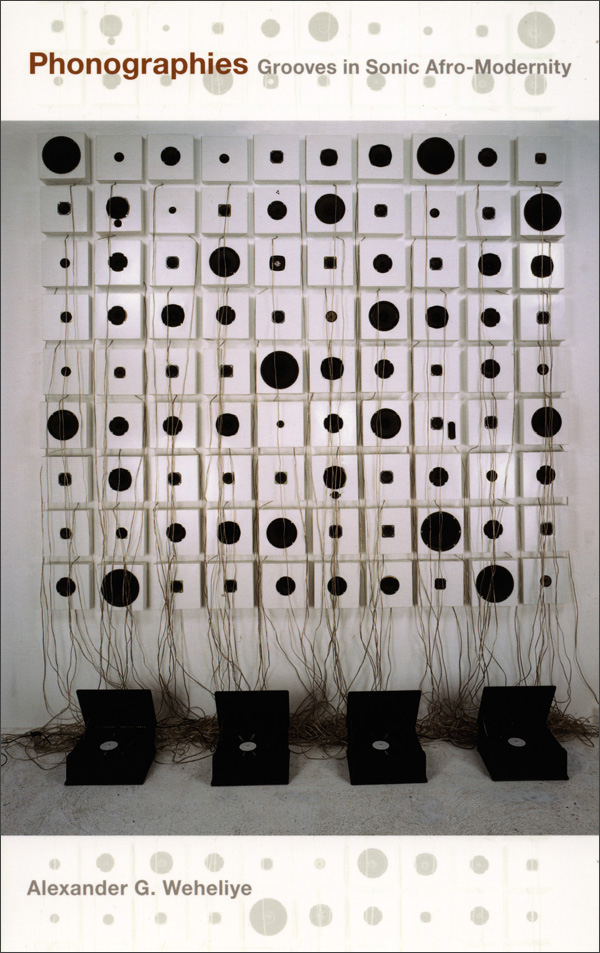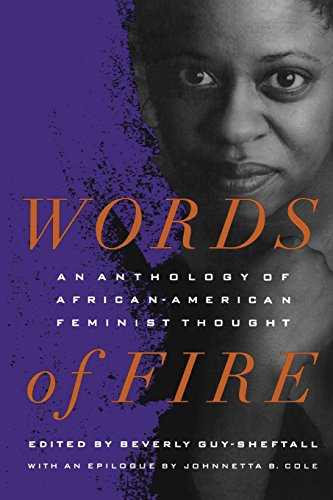Alexander G. Weheliye: Phonographies: Grooves in Sonic Afro-Modernity (2005)
Filed under book | Tags: · black people, djs, hip hop, modernity, music, music history, phonograph, sound, sound recording, technology

“Phonographies explores the numerous links and relays between twentieth-century black cultural production and sound technologies from the phonograph to the Walkman. Highlighting how black authors, filmmakers, and musicians have actively engaged with recorded sound in their work, Alexander G. Weheliye contends that the interplay between sound technologies and black music and speech enabled the emergence of modern black culture, of what he terms ‘sonic Afro-modernity’. He shows that by separating music and speech from their human sources, sound-recording technologies beginning with the phonograph generated new modes of thinking, being, and becoming. Black artists used these new possibilities to revamp key notions of modernity—among these, ideas of subjectivity, temporality, and community. Phonographies is a powerful argument that sound technologies are integral to black culture, which is, in turn, fundamental to Western modernity.
Weheliye surveys literature, film, and music to focus on engagements with recorded sound. He offers substantial new readings of canonical texts by W. E. B. Du Bois and Ralph Ellison, establishing dialogues between these writers and popular music and film ranging from Louis Armstrong’s voice to DJ mixing techniques to Darnell Martin’s 1994 movie I Like It Like That. Looking at how questions of diasporic belonging are articulated in contemporary black musical practices, Weheliye analyzes three contemporary Afro-diasporic musical acts: the Haitian and African American rap group the Fugees, the Afro- and Italian-German rap collective Advanced Chemistry, and black British artist Tricky and his partner Martina. Phonographies imagines the African diaspora as a virtual sounding space, one that is marked, in the twentieth century and twenty-first, by the circulation of culture via technological reproductions—records and tapes, dubbing and mixing, and more.”
Publisher Duke University Press, Durham, NC, 2005
ISBN 0822335778, 9780822335771
xii+286 pages
Reviews: Matthew Somoroff (NewBlackMan, 2006), Greg Tate (Souls, 2007), Emma Louise Kilkelly (Journal of American Studies, 2007), George Lipsitz (Journal of the Society for American Music, 2008).
Commentary: Alexander G. Weheliye (Small Axe, 2014), Tavia Nyong’o (Small Axe, 2014).
PDF (updated on 2021-4-13)
Comment (0)John Akomfrah & Black Audio Fillm Collective: Handsworth Songs (1986)
Filed under video | Tags: · black people, essay film, protest, race, resistance
“Handsworth Songs was released in 1986 as a cultural response to social unrest in Birmingham and London in October 1985, looking at the way events unfolded, the two deaths (that of black woman Cynthia Jarrett and white policeman Keith Blakelock), and the subsequent media reaction.
Subsequently selected by Okwui Enwezor for inclusion in the 2002 Documenta XI in Kassel and acquired by Tate, this early work by the Black Audio Film Collective has become not only an influential touchstone for an entire genre of essayistic filmmaking, but an important document on the state of race relations in Britain since the landing of the Empire Windrush in 1948.”
“Through an impressionistic mélange of newsreel footage, photographs, and interviews, Handsworth Songs arrives at a powerful, allusive, and deeply personal statement about the black British experience.” (Ashley Clark)
Directed by John Akomfrah/Black Audio Film Collective, 1986
Produced by Lina Gopal
Commissioned by Channel 4 for their series Britain: The Lie of the Land
61 min
Interview with Collective: Paul Gilroy and Jim Pines (Framework, 1988).
Online discussion (18 June 2020)
Commentary: Salman Rushdie, Stuart Hall, Darcus Howe (The Guardian, 1987), Isaac Julien and Kobena Mercer (Screen, 1988), Stuart Hall (ICA Documents, 1989, PDF), Kobena Mercer (The Independent, 1989), Mark Fisher (Sight & Sound, 2011), Dara Waldron (Open Library of Humanities, 2017), Ann Ogidi (BFI, n.d.).
Review: John Sutherland (American Historical Review, 1989).
WEBM (427 MB)
Transcript, PDF (added on 2023-7-3)
Beverly Guy-Sheftall (ed.): Words of Fire: An Anthology of African-American Feminist Thought (1995)
Filed under book | Tags: · black people, body, civil society, class, feminism, gender, politics, race, reproduction, resistance, sex, sexuality, violence, women

“This anthology traces the development, from the early 1800s to the present, of black feminist thought in the United States, Words of Fire is Beverly Guy-Sheftall’s comprehensive collection of writings, in the feminist tradition, of more than sixty African American women. From the pioneering work of abolitionist Maria Miller Stewart and anti-lynching crusader Ida Wells-Barnett to the writings of contemporary feminist critics Michele Wallace and bell hooks, black women have been writing about the multiple jeopardies—racism, sexism, and classism—that have made it imperative for them to forge a brand of feminism uniquely their own.”
With an epilogue by Johnnetta B. Cole
Publisher The New Press, New York, 1995
ISBN 1565842561, 9781565842564
xxvi+577 pages
Reviews: Yvonne Chireau (Georgia Historical Quarterly, 1996), Kamili Anderson (Diverse, 2007).
PDF (6 MB)
See also This Bridge Called My Back: Writings by Radical Women of Color (1981) and Home Girls: A Black Feminist Anthology (1983).
Comment (0)
